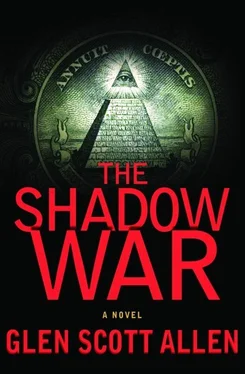Glen Allen - The shadow war
Здесь есть возможность читать онлайн «Glen Allen - The shadow war» весь текст электронной книги совершенно бесплатно (целиком полную версию без сокращений). В некоторых случаях можно слушать аудио, скачать через торрент в формате fb2 и присутствует краткое содержание. Жанр: Триллер, на английском языке. Описание произведения, (предисловие) а так же отзывы посетителей доступны на портале библиотеки ЛибКат.
- Название:The shadow war
- Автор:
- Жанр:
- Год:неизвестен
- ISBN:нет данных
- Рейтинг книги:5 / 5. Голосов: 1
-
Избранное:Добавить в избранное
- Отзывы:
-
Ваша оценка:
- 100
- 1
- 2
- 3
- 4
- 5
The shadow war: краткое содержание, описание и аннотация
Предлагаем к чтению аннотацию, описание, краткое содержание или предисловие (зависит от того, что написал сам автор книги «The shadow war»). Если вы не нашли необходимую информацию о книге — напишите в комментариях, мы постараемся отыскать её.
The shadow war — читать онлайн бесплатно полную книгу (весь текст) целиком
Ниже представлен текст книги, разбитый по страницам. Система сохранения места последней прочитанной страницы, позволяет с удобством читать онлайн бесплатно книгу «The shadow war», без необходимости каждый раз заново искать на чём Вы остановились. Поставьте закладку, и сможете в любой момент перейти на страницу, на которой закончили чтение.
Интервал:
Закладка:
Benjamin was about to tell Anton about his discovery in the mural at the manse and his suspicion they may have been around much longer than that; but once again, he hesitated. His only evidence was an indistinct little doodad in that immense painting. And once again, he decided it was simply too fantastic to get into now, and that he should stay focused on what he'd learned from the diary.
"At the very least," Benjamin continued, "it explains why the Morris family had this fake diary created and saw to it the real one was hidden. In 1929, the Morris family and the other benefactors were establishing the Heritage Institute for Good Government, something they hoped would help restore the world's shining hope for democracy. And this was at a time when that democracy was struggling to survive. There were demagogues like Father Coughlin on the right and radicals like the Wobblies on the left…" Benjamin thought for a moment, then nodded. "Yes, I can see how they would have considered it embarrassing to have it revealed that their ancestors had been fanatical racists and antidemocratic conspirators. How they might have even considered murder justified in keeping such a secret. And finally, isn't that symbol just a little too much of a… coincidence?"
Anton pursed his lips. "Coincidence just low probability," he said. "Not proof."
Benjamin saw the skepticism in Anton's eyes and began to doubt his own conclusions. Now not just the mural but the whole story began to sound like a paranoid fantasy.
"I don't know," said Benjamin, rubbing his eyes. "Perhaps you're right. How could they have kept it secret for so long, among so many people?"
"Don't give up so fast. Maybe, like in Party, most didn't know what Eye guys up to. Best conspiracy one you don't tell anyone they're part of."
Benjamin looked up. "Odd you should put it that way," he said.
"What?"
"It's just, that sounds very much like something Samuel said… the last time we talked."
"Sam smart guy," he said, trying to sound reassuring. "Maybe smartest thing he do, keep you at Foundation."
"At least all this," he waved at Benjamin's notes on the table, "fill one big hole in TEACUP. If these Eye guys did sabotage plantation, maybe even get Indians to destroy it, then explains 'wobble' number one, yes?"
"You mean, they manipulated King Philip's War into happening? That's what the TEACUP program revealed to Jeremy?"
"Or would have," Anton nodded, "if he'd had Bainbridge diary. But still leaves other big hole. Which is Stzenariy 55. "
"Damn!" Benjamin said, standing up. He looked around for a clock. "What time is it?"
"Oh yes," said Anton, "your date." He looked Benjamin over. "You can't go meet Bolshoi like that," he said.
"Oh, god," said Benjamin, looking at himself in a mirror. What he saw was a very rumpled suit, a wrinkled shirt, uncombed hair, and a dark five o'clock shadow.
He turned to Anton. "Unfortunately, I didn't pack black tie for the Foundation. I'll have to go by my apartment, clean up, and at least put on a fresh suit."
"Not such good idea," Anton said. "Apartment probably last place you want to go."
"Then what the hell am I supposed to do?" Benjamin said angrily. He ran a hand through his hair, rubbed his neck. "Sorry, I'm just tired and cranky."
"Is okay," said Anton. "My son leave some clothes here. Big businessman. I think tuxedo in his closet." He looked at Benjamin. "Older and bigger than you, but fit okay." He smiled. "Maybe."
CHAPTER 31
The taxi dropped Benjamin off in front of the Russian Cultural Center on Phelps Place. He climbed the steps, then stood at the back of a line of several people, all of them in elegant evening dress. He felt like something of a clown in Anton's son's tuxedo: the sleeves were too long, the jacket too big, and the pants had been hurriedly hemmed by Anton with pins and tape; Benjamin expected the hem to drop down over his too-large shiny black dress shoes at any moment.
After the guard checked his name on the invitation list, he walked into the building and its lavishly decorated foyer.
There was a large round table with a huge bouquet of red roses in the foyer's center, and red-and-gold banners were draped around its ceiling. On his right in a large dining room, each table had its own centerpiece of red roses and white baby's breath; to his left was an equally large reception hall, dotted everywhere with more bouquets of roses. Dozens of elegantly dressed people stood in groups while around them circulated waiters dressed in red-and-white uniforms and carrying golden trays of champagne.
My, thought Benjamin, the times of Soviet drabness certainly are over.
The reception hall had a polished parquet floor and stark white walls adorned with rectangular panels and fronted by grooved pillars. Panels and pillars alike were edged with gold gilt filigree. The overall effect was impressively imperial. At one end of the room hung an enormous red banner, with writing in huge gold letters: Большой amp; Aмерика-1776-Bolshoi amp; America
At the other end of the room was an equally large banner, but this one was white, with green edging to form a continual border of ivy, in the center of which was embroidered, in blue letters: Let Our Two Nations Never Again Polarize
Benjamin noted that this second banner was in English only.
Light from several large brass chandeliers reflected in a mirror that ran along almost the entire length of one wall; opposite the mirror was a large, white-veined marble fireplace, complete with crackling fire. With all the people in the room, Benjamin felt a trifle overheated and began looking for something to drink.
He walked to a nearby group, where he saw a waiter with a tray of champagne, and took a glass from the tray. Then he realized the group was something of an informal reception line and, before he could move, the first person in the line was extending his hand for Benjamin to shake.
"Ambassador Vasily I. Schastny," the man said. He was tall, with a broad Slavic face and expertly clipped hair. "How do you do."
"Benjamin Wainwright," he said, shaking the man's hand. He noticed his grip was quite solid, and a little threatening. He felt the need to add something to his identification. "Scholar of American history," he said.
"Ah," Vasily replied. He looked a trifle surprised, but said with a bright smile, "An academician." He turned to the woman next to him. "And this is Irina Sedova, director of our little cultural outpost."
The woman turned to greet Benjamin, extending her hand. She, in turn, introduced him to a woman wearing a dramatically low-cut black evening gown and too much eye makeup. "Prima ballerina Leonora Zenova." Madame Zenova held her hand out to be kissed, and Benjamin immediately if a little awkwardly bent slightly and bussed her fingers with his lips.
"Charmed," was the only thing he could think of to say.
And so it went, on down the line. Benjamin couldn't really keep track of the names, though he noticed there were as many Americans as Russians. The last couple was quite old, the man sporting a very well-trimmed mustache and pointed goatee, and the woman wearing a small silver tiara. They were introduced as "Prince Obolensky and Princess Gagarin." Benjamin wasn't sure whether or not to bow, but he decided that would be a bit too nineteenth century.
When he exited the receiving line, Benjamin felt a bit dizzy from names and titles. And he still needed to locate Ms. Orlova.
Looking about, he saw no one that seemed the sort he could simply walk up to and ask for directions. He finally decided to try a waiter. From the waiter he got another glass of champagne and a suggestion he try one of the security men standing at intervals along the wall. He found one of them-apparently a clone of the man at the door, complete with earpiece but absent clipboard. When he asked after Natalya Orlova, he got an inquisitive look. For a moment he wasn't sure the man understood English.
Читать дальшеИнтервал:
Закладка:
Похожие книги на «The shadow war»
Представляем Вашему вниманию похожие книги на «The shadow war» списком для выбора. Мы отобрали схожую по названию и смыслу литературу в надежде предоставить читателям больше вариантов отыскать новые, интересные, ещё непрочитанные произведения.
Обсуждение, отзывы о книге «The shadow war» и просто собственные мнения читателей. Оставьте ваши комментарии, напишите, что Вы думаете о произведении, его смысле или главных героях. Укажите что конкретно понравилось, а что нет, и почему Вы так считаете.












